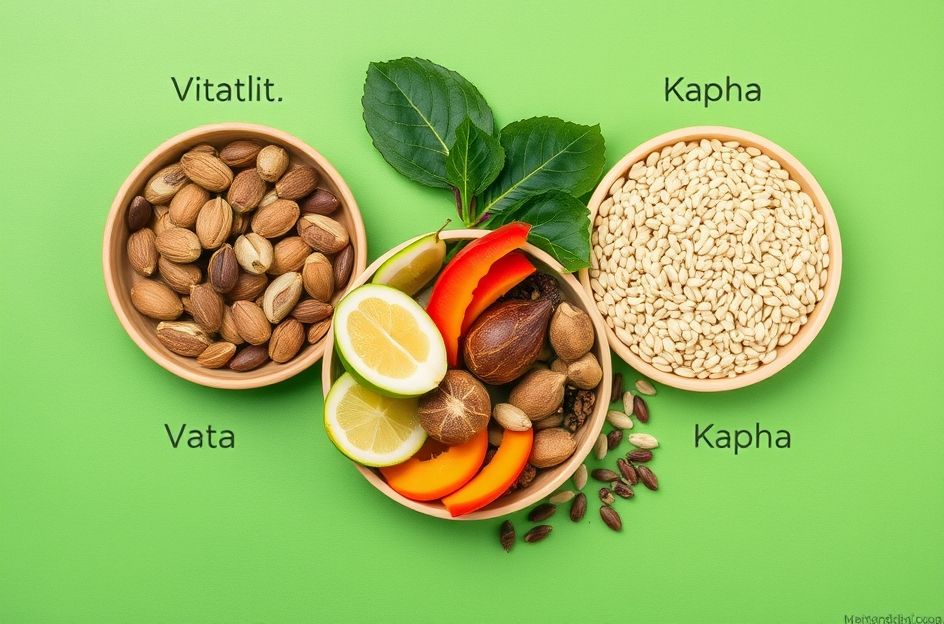Ayurveda emphasizes tailoring dietary choices to individual body types, known as doshas: Vata, Pitta, and Kapha. This approach aims to promote balance and prevent the accumulation of ‘Ama,’ or toxins, in the body. While individuals may predominantly exhibit one dosha, all three are present to varying degrees. Recognizing your dominant dosha(s) is key to making informed food choices.
Pitta:
Pitta Body Type Characteristics:
* Determined
* Strong-willed
* Efficient digestion
* Initiative-driven
* Energetic
* Passionate
To balance Pitta, favor cooling foods like fresh fruits and vegetables. Bitter greens such as watercress, parsley, and collard greens are beneficial. Suitable fruits include sweet berries, apples, apricots, coconut, figs, mangoes, sweet oranges, pineapples, plums, watermelon, pomegranates, and prunes.
Most dairy products are cooling, but limit sour cream, hard cheeses, and yogurt due to their high fat or salt content. Better choices include milk, cottage cheese, soft cheeses, and even ice cream in moderation.
Grains like barley, basmati rice, and wheat (if tolerated) are good options. Pitta types often have higher protein needs, benefiting from cooling spices like coriander, cumin, mint, parsley, dill, and fennel. Avoid heating spices like garlic.
For sweeteners, opt for maple syrup, barley malt, brown rice syrup, and raw honey (less than 6 months old).
Factors that can disrupt Pitta balance:
* Excessive heat, hot climates, and hot times of day
* Humidity
* Overexertion
* Excessive oil consumption
* Too many hot or spicy foods, and overly cooked meals
* Excessive caffeine, salt, red meat, and alcohol
Vata:
Vata Body Type Characteristics:
* Flexible
* Quick-minded
* Creative
* Energetic (both mentally and physically)
Dietary recommendations for Vata focus on grounding this mobile energy. Routine, warmth, soothing music, breaks, and rest are also crucial. Incorporate warming spices such as ginger, cloves, anise, cayenne, cinnamon, garlic, horseradish, caraway, mint, mustard seeds, parsley, cooked onion, paprika, rose water, vanilla, tarragon, thyme, and rosemary.
Minimize raw foods, especially salads, but don’t eliminate them entirely. When consuming salads, use an oil-and-vinegar dressing and be mindful of the weather, opting for warmer days. Avoid icy cold drinks and excessive sugar.
Most fruits are beneficial, except for apples, pears, cranberries, watermelon, and dried fruits. Choose sweet and moist fruits like mangoes, nectarines, bananas, coconut, fresh figs, peaches, and strawberries.
Cooked grains like oatmeal, basmati rice, and brown rice are grounding. However, minimize beans (legumes) due to their cold, dry, and heavy qualities.
Factors that can disrupt Vata balance:
* Extensive travel, especially by air
* Loud noises
* Constant stimulation
* Drugs, sugar, and alcohol
* Cold climates and cold foods
* Frozen and dried foods
Kapha:
Kapha Body Type Characteristics:
* Strong
* Great Stamina
* Enduring
* Grounded
* Calm
* Fluid
Kapha types should avoid high-protein diets like the Atkins diet, as well as excessive fat and heavy protein. While Kapha already embodies a sense of ‘heaviness,’ this provides stability and strength. Focus on light, low-fat protein, with beans (except soy) being excellent choices. Soy milk is preferable to dairy. Beans aid in stimulating Kapha’s energy and digestive system. Barley is also beneficial. For meat, chicken and turkey are suitable.
Consume plenty of vegetables, especially bitter varieties, peppers, broccoli, Brussels sprouts, cauliflower, eggplant, lettuce, onions, potatoes, mushrooms, corn, peas, beets, and celery.
Dairy is heavy and cooling, making it less suitable for Kapha. Light and crispy foods like corn tortillas and popcorn are better options. Kapha types should prioritize variety in their diet to avoid falling into a rut.
Asian and Latin American-style meals, known for being spicy, light, dairy-free, and vegetable-rich, are excellent choices.
Factors that can disrupt Kapha balance:
* Inactivity
* Excessive fat consumption, including cooking oils
* Dairy products
* Lack of stimulation and challenge
* Lack of variety
* Insufficient exercise
* Excessive bread, iced foods and drinks, and sweets
Reference: Amadea Morningstar and Urmila Desai, *The Ayurvedic Cookbook*
